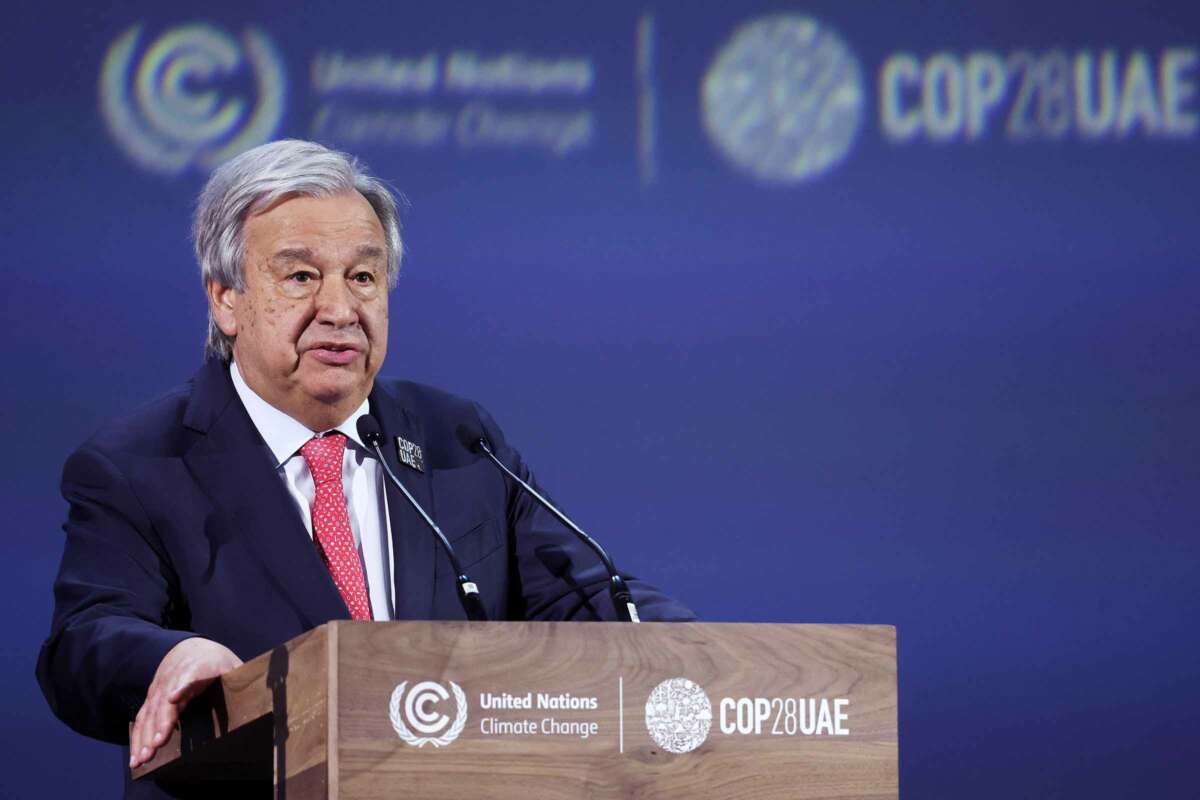Did you know that Truthout is a nonprofit and independently funded by readers like you? If you value what we do, please support our work with a donation.
United Nations Secretary-General António Guterres repeated the call for a global phaseout of fossil fuels during his remarks at the opening of the World Climate Action Summit as the U.N. Climate Change Conference entered its second day on Friday.
Guterres delivered a dire warning to the 260 world leaders gathered for the two-day summit taking place within the two week COP28 conference in Dubai as he urged them to ramp up their climate ambitions in the name of the future of human civilization.
“The science is clear,” Guterres said. “The 1.5°C limit is only possible if we ultimately stop burning all fossil fuels. Not reduce. Not abate. Phaseout — with a clear timeframe aligned with 1.5°C.”
Guterres began his remarks on a positive note, congratulating COP28 President Sultan Ahmed Al Jaber for a day-one agreement to operationalize the long-awaited “loss and damage” fund for developing nations. However, he quickly took a somber tone as he described recent visits to Antarctica and Nepal where he had seen ice and glaciers melt.
He said the ice loss was “just one symptom of the sickness bringing our climate to its knees. A sickness only you, global leaders, can cure.”
“The 1.5-degree limit is only possible if we ultimately stop burning all fossil fuels.
Not reduce.
Not abate.
Phaseout.”@UN Secretary General @antonioguterres | #COP28 pic.twitter.com/keeocNL67w
— UN Climate Change (@UNFCCC) December 1, 2023
“Earth’s vital signs are failing: record emissions, ferocious fires, deadly droughts, and the hottest year ever,” Guterres continued. “We can guarantee it even when we’re still in November. We are miles from the goals of the Paris agreement — and minutes to midnight for the 1.5-°C.”
The cure could come, Guterres said, with a successful “global stocktake.” The global stocktake is a mechanism of the Paris agreement whereby world leaders assess their progress to date and set new goals. The first global stocktake concludes with the current conference in Dubai, and the process will repeat every five years from here on out.
Guterres made three main recommendations for the first stocktake:
- “Drastically” reducing emissions: Guterres pointed out that countries’ current nationally determined contributions under the Paris agreement put the world on track for around 3°C of warming and urged them to update their pledges in line with the 1.5°C goal. He said that G20 countries, which are responsible for 80% of emissions, should take the lead on this, and that richer nations should aim to reach net-zero by 2040 while less wealthy ones shoot for 2050.
- Speeding a “just transition”: In addition to phasing out fossil fuels, Guterres said countries should agree to triple renewable energy, double energy efficiency, and ensure everyone has access to renewable energy by 2030.
- Ensuring “long overdue” climate justice: Guterres called for a “surge in finance” to help poorer, climate vulnerable nations adapt to climate impacts they did little to cause and compensate for loss and damage. He also said that leaders should recommend reforms of the multilateral development banking system so that developing nations could access funds without increasing their debt burden. Finally, he said that wealthier nations must fulfill their promises to provide $40 billion a year in adaptation finance by 2025 and $100 billion a year in climate finance by 2020.
In his remarks on fossil fuels and clean energy, Guterres also addressed fossil fuel executives directly.
“Your old road is rapidly changing,” he said, quoting Bob Dylan’s “The Times They Are a-Changin.'”
Guterres cited International Energy Agency (IEA) figures finding that oil and gas companies provide only 1% of all clean energy investments.
“Do not double-down on an obsolete business model,” Guterres said, addressing fossil fuel CEOs and the hundreds of industry lobbysists in attendance at the conference. “Lead the transition to renewables using the resources you have available. Make no mistake — the road to climate sustainability is also the only viable pathway to economic sustainability of your companies in the future.”
Guterres ended his speech with a call to leadership.
“Humanity’s fate hangs in the balance,” he said. “Make this COP count. Make this COP a gamechanger. Make this COP the new hope in the future of humankind.”
Speaking against the authoritarian crackdown
In the midst of a nationwide attack on civil liberties, Truthout urgently needs your help.
Journalism is a critical tool in the fight against Trump and his extremist agenda. The right wing knows this — that’s why they’ve taken over many legacy media publications.
But we won’t let truth be replaced by propaganda. As the Trump administration works to silence dissent, please support nonprofit independent journalism. Truthout is almost entirely funded by individual giving, so a one-time or monthly donation goes a long way. Click below to sustain our work.
